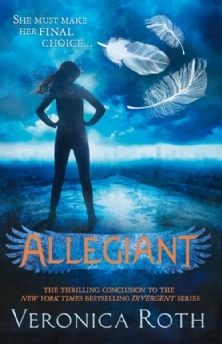“I suppose a fire that burns that bright is not meant to last.”
SPOILERS AHOY! I'm putting that out here loud and clear. This is the final installment of the Divergent series and I am going to talk about it with spoilers because...because I am, that's why. I have feelings. So once again, I say SPOILERS!SPOILERS!SPOILERS!
Also? SPOILERS!
This kicks off where the last book ended, with Jeanine defeated, Four's mother in charge, and the factions a hot mess. This is the only book told from dual perspectives - we shift between Four/Tobias and Tris, which I'll talk more about later. Tris and Four venture outside the fence, as instructed by the video played at the end of the last book, and discover what I expected all along - the world outside exists, and their city was an experiment. However, where I figured it was a purely social experiment, it turns out that it's a genetic one - there has been a war, and genetic modifications were at the heart of it. Instead of racial tensions, or gender, or sexual - this is a world where genetic purity is key, and the infrastructure of society is based upon a class distinction dictated by what's been done to your genes. Tris' divergence, it turns out, is a sign that her genes have corrected themselves through the generations and she is now pure.
Of course, this type of class tension is really no different from the faction tension Tris just escaped. And a girl like that doesn't know how to avoid championing a cause, so she jumps right into the fray of this one. Her involvement is supported later when the home she knew is threatened by the messed up society she's walked into.
I'm torn on how I feel about this book. It's not as good as its predecessors for a variety of reasons. Much like Collins did with Hunger Games, this trilogy moves from a set world into a larger one, and into larger issues, in the concluding volume. I think both book suffer a bit from the widened scope. I enjoyed the factions and how they interacted - this abandoned that almost entirely to focus on the gene war, and I had no investment in that. The shifting narrative also occasionally left me cold. I like being inside Four's head - he's a wonderful character - but the bouncing back and forth lost me every now and then. I'd sometimes have to remind myself who I was with in a given chapter.
And the ending. I'm sure the ending is the make or break point for most fans of the series. On the one hand, I don't think it's necessarily the "wrong" choice for Tris to die a martyr. What happens more or less makes sense, and it ups the stakes to have that kind of real sacrifice. At the same time...after all the things she endures, and the things her divergence makes her able to overcome, it almost felt cheap to let her get shot to death. More than that, after all Four has survived, having him try to live life without her seemed just a little too cruel. I have a hard time with books that kill the protagonist, whether it makes narrative sense or not, and this is no exception. So while it's not a *bad* ending, per se, it's not satisfying for me.
The movie is coming up, and I'm interested to see what changes from book to screen. I'm slightly less excited now that there's an end, and it's this, but I'll still go see them. And I still recommend the trilogy to anyone, but with the caveat this last volume isn't necessarily going to please everyone.

No comments:
Post a Comment